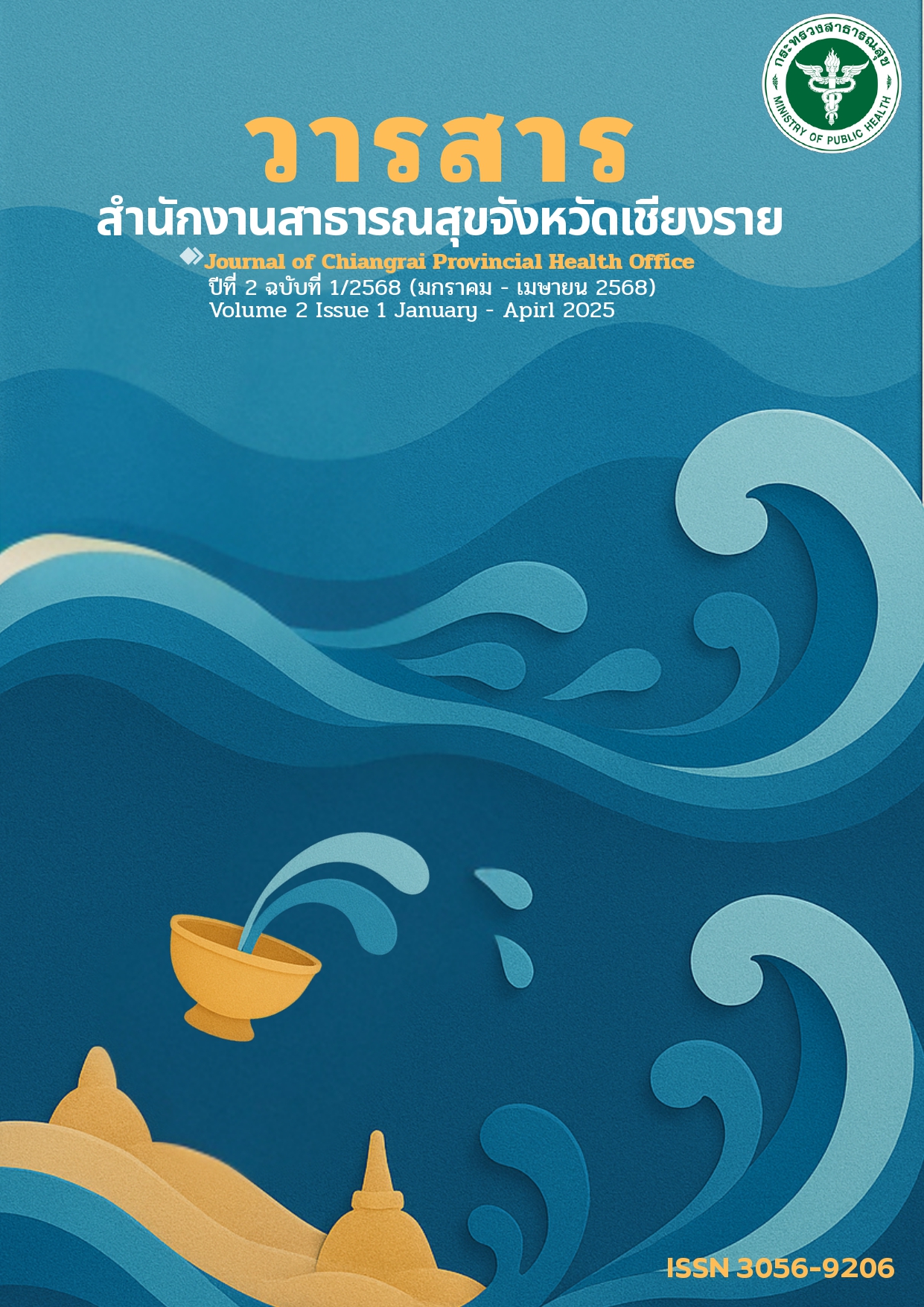The Outcomes of a Self-Care Educational Program for Patients with Type 2 Diabetes at the Outpatient Department of Chiang Khong Crown Prince Hospital
Keywords:
Diabetes Self-Care Education Program, Type 2 Diabetes Patients, Self-care behaviorsAbstract
This study is quasi-experimental research with a one-group pretest-posttest design. The objective is to compare the mean knowledge about diabetes, self-care behaviors, and blood glucose levels after fasting, before and after using the self-care management education program for patients with Type 2 diabetes at the outpatient department of Chiang Khong Crown Prince Hospital
The sample group in this study consisted of patients with type 2 diabetes who had blood sugar levels greater than 140 mg/dL on two occasions within six months and were registered at the outpatient department of Chiang Khong Crown Prince Hospital, totaling 30 individuals. Participants were selected using a purposive sampling method based on specific criteria. The intervention used was an educational program for self-care in type 2 diabetes patients. The tools used in this study included a general demographic questionnaire, a general diabetes knowledge test, and a self-care behavior questionnaire. Data were collected from January to February 2025. The data were analyzed using descriptive statistics, including frequency, percentage, mean, and standard deviation, and inferential statistics using paired t-test
The study found that the experimental group, after participating in the educational program for self-care in diabetes, showed an increase in diabetes knowledge and self-care behaviors, as well as a significant reduction in blood sugar levels (p<0.05). It is recommended that educational activities based on the program be organized regularly and continuously to promote sustainable positive behaviors and expand the impact to other patient groups.
References
ธนพร แก้วเนตร. ประสิทธิผลของโปรแกรมสร้างเสริมสุขภาพในผู้ป่วยเบาหวานที่ควบคุมระดับน้ำตาลไม่ได้. วารสารวิทยาศาสตร์และเทคโนโลยี มหาวิทยาลัยราชภัฏศรีสะเกษ. 2566; 3(1), 55-67.
พวงเพชร เหล่าประสิทธิ์. การพัฒนาระบบการดูแลผู้ป่วยโรคเบาหวานที่ควบคุมระดับน้ำตาลในเลือดไม่ได้ของโรงพยาบาลพุนพินและโรงพยาบาลส่งเสริมสุขภาพระดับตำบลเครือข่าย. วารสารวิชาการแพทย์เขต 11. 2565; 37(1), 29-45.
พูนทรัพย์ สมกล้า สร้อยสุดา ครองปัญญา และวริดา นามเชียงใต้. (2567). ผลของโปรแกรมการดูแลตนเองและการมีส่วนร่วมของครอบครัวต่อการควบคุมระดับน้ำตาลในเลือดของผู้ป่วยเบาหวานชนิดที่ 2 ในคลินิกเบาหวาน โรงพยาบาลมหาสารคาม. วารสารโรงพยาบาลมหาสารคาม. 2567; 21(1), 188-202.
วนิดา ศรีริภาพ. พฤติกรรมการดูแลตนเอง และระดับน้ำตาลในเลือดของผู้ป่วยโรคเบาหวาน ในกลุ่มที่ควบคุม ระดับน้ำตาลในเลือดได้ และกลุ่มที่ควบคุมระดับน้ำตาลในเลือดไม่ได้. Journal of Sciences and Pedagogy. 2564; ปีที่ 1 ฉบับที่ 2 พฤษภาคม - สิงหาคม 2564. 57-68.
วรางคณา บุตรศรี รัตนา บุญพา และชาญณรงค์ สิงห์บรรณ. ผลของโปรแกรมการให้ความรู้ต่อพฤติกรรมการดูแลตนเองและการควบคุมระดับน้ำตาลในเลือดในผู้ป่วยเบาหวานชนิดที่ 2 ที่ควบคุมระดับน้ำตาลในเลือดไม่ได้. วารสารวิชาการมหาวิทยาลัยการจัดการและเทคโนโลยีอีสเทิร์น. 2564;18(1), 13-25.
สมาคมโรคเบาหวานแห่งประเทศไทย และสมาคมต่อมไร้ท่อแห่งประเทศไทย. (2566). แนวทางเวชปฏิบัติ สำหรับโรคเบาหวาน 2566. (พิมพ์ครั้งที่ 2). กรุงเทพฯ; 2566.
สำนักโภชนาการ กรมอนามัย [อินเทอร์เน็ต]. หลักทั่วไปในการควบคุมพฤติกรรมการบริโภคอาหารสำหรับผู้เป็นเบาหวาน; 2558. [เข้าถึงเมื่อวันที่ 18 กันยายน 2567]. เข้าถึงได้จาก http://nutrition. anamai. moph. go.th/images/files
สุทัสสี รังวารี. ผลการใช้โปรแกรมการให้ความรู้สำหรับการดูแลของผู้ป่วยเบาหวานชนิดที่ 2 งานการพยาบาลผู้ป่วยนอก โรงพยาบาลอากาศอำนวย. วารสารสุขภาพและสิ่งแวดล้อมศึกษา. 2566; 8(4), 152-161.
เสาวรัตน์ เฮงยศมาก. ประสิทธิผลโปรแกรมการดูแลผู้ป่วยเบาหวานที่ควบคุมระดับน้ำตาลในเลือดไม่ได้ โรงพยาบาลสามโคก. โรงพยาบาลสามโคก; 2567. [เข้าถึงเมื่อวันที่ 18 กันยายน 2567]. เข้าถึงได้จาก https://ptepho. moph. go.th /2023/Fileupload/ejournal/ptepho1106858349.pdf
Downloads
Published
How to Cite
Issue
Section
License
Copyright (c) 2025 Chiang Rai Provincial Health Office

This work is licensed under a Creative Commons Attribution-NonCommercial-NoDerivatives 4.0 International License.
บทความที่ได้รับการตีพิมพ์เป็นลิขสิทธิ์ของสำนักงานสาธารณสุขจังหวัดเชียงราย
ข้อความที่ปรากฏในบทความแต่ละเรื่องในวารสารวิชาการเล่มนี้เป็นความคิดเห็นส่วนตัวของผู้เขียนแต่ละท่านไม่เกี่ยวข้องกับสำนักงานสาธารณสุขจังหวัดเชียงราย และบุคลากรท่านอื่น ในสำนักงานสาธารณสุขจังหวัดเชียงราย แต่อย่างใด ความรับผิดชอบองค์ประกอบทั้งหมดของบทความแต่ละเรื่องเป็นของผู้เขียนแต่ละท่าน หากมีความผิดพลาดใด ๆ ผู้เขียนแต่ละท่านจะรับผิดชอบบทความของตนเองแต่ผู้เดียว



